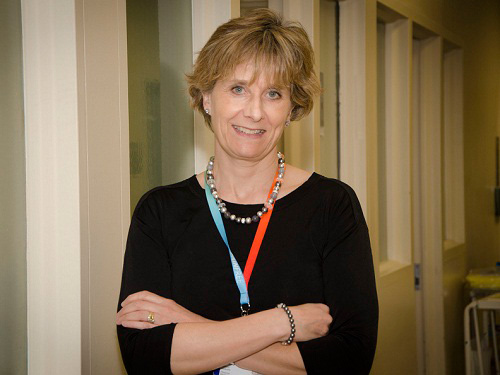
RI-MUHC team receives a $648,239 grant for their eHealth innovative project
By MUHC Public Affairs
Hip fractures are one of the most common injuries sustained by the elderly population following a fall.
This often results in a number of complications, and many patients never fully recover. A team from the Research Institute of the McGill University Health Centre (RI-MUHC) led by clinician scientist Dr. Suzanne Morin, in partnership with Greybox Solutions Inc., decided to tackle this problem by developing a rehabilitation and e-learning program using a “smart” shoe sole which connects to a tablet to provide remote monitoring and coaching. This technology will guide patients healing from hip fractures and their families through the recovery period at home.
Their project, called HIP@HOME, is one of 22 innovative eHealth projects from across the country supporting mental health and youth and seniors with complex care needs which received a total of $13.8M from the Canadian Institutes for Health Research (CIHR) eHealth Innovation Partnership Program (eHIPP). The funding was announced March 3, by the Minister of Health, Jane Philpott, and the Minister of Innovation, Science, and Economic Development, Navdeep Bains.
“I am delighted that our program was selected as one of the top Canadian research projects designed to empower patients and enable better health care,” says Dr. Morin who is an associate professor of the Department of Medicine at McGill. “It’s an exciting and challenging study that we hope will lead to improving patient experience and outcomes in terms of autonomy following hip fracture and possibly contribute to lower healthcare system costs.”
The research team, who received a $648,239 grant over four years from the CIHR, will work in partnership with the RI-MUHC and Greybox Solutions Inc. – a Montreal based company that specializes in healthcare technologies – to develop an intelligent sole for shoes that will measure the speed, number of steps, distance or exercise performed by patients during their rehabilitation period. All the data will be remotely collected through a program available on electronic tablets. The research team will then be able to coach patients in self-management and remotely monitor their health status. Patient recruitment will start in the coming months.
“Innovation in biomedicine is one of the pillars of the RI-MUHC, as is perfectly illustrated by the project developed by Dr. Morin’s team,” says Dr. Vassilios Papadopoulos, Executive Director and Chief Scientific Officer of the RI-MUHC and Associate Executive Director for Research of the MUHC. “I believe, as a multidisciplinary team, they will certainly achieve their goals of improving health outcomes for our aging population.”
Delivered by the CIHR, eHIPP was developed in partnership with the National Research Council of Canada Industrial Research Assistance Program (NRC-IRAP) to stimulate collaborations between health researchers and Canadian innovative technology companies. By bringing academia and industry together, eHIPP is ensuring that eHealth innovations are being co-developed, tested with the people who will need them and evaluated for their cost-effectiveness.
